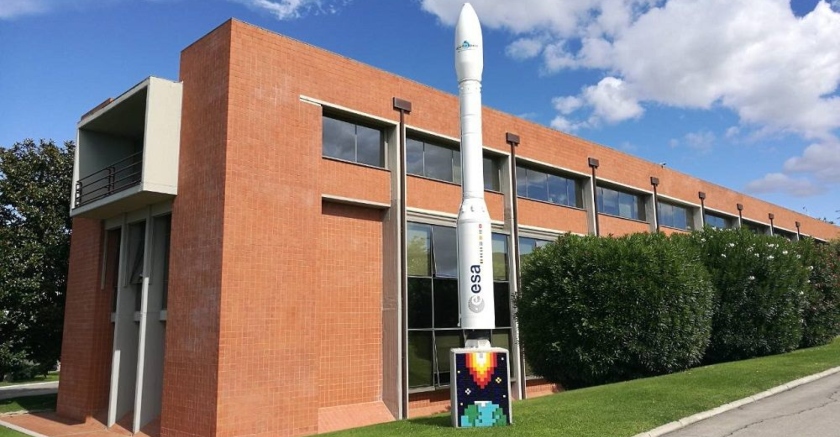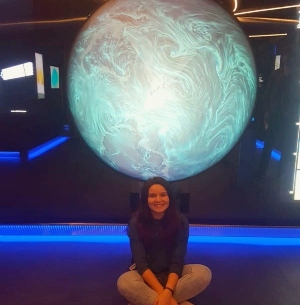
February 21, 2022, by Jackie Thompson
Turn Your Passion for Space Into a Career
By Cristina Vrînceanu, Postgraduate Research Student
“ ‘Space’, it says, ‘is big. Really big. You just won’t believe how vastly, hugely, mind-bogglingly big it is. I mean, you may think it’s a long way down the road to the chemist’s, but that’s just peanuts to space.’ ” This is how Douglas Adams describes space, but each of us have our own ways to discover what’s beyond our blue dots frontier. But how will you start your journey to discovery?
It begins with a call…
A call for Young Graduate Trainees (YGT) programme involving a one-year placement in a European Space Agency establishment. It is aimed at recent masters graduates or individuals that have had no prior extensive experience in the space sector. This is truly an exciting way to get your foot into space. In 2018, I was a recent graduate working in the geospatial sector, fascinated by the beauty and insight we could get from satellite data. So much so, that I wished for a career change and avidly looked for an opening in the earth observation sector.
Is the YGP for engineers only?
If you think you might not be completing the right degree for a career in space because you are not an engineer, that’s not the case.
I’m a geographer by training, but my fellow YGT colleagues came from all sorts of backgrounds: data science, computer engineering, archival studies, law, business, mathematics, physics, environmental, mechanical or chemical engineering, we all had these things in common: passion and curiosity for space.
Applying for the YGT programme
This was it! I made an application and here’s some advice for your application:
- have a look at all the published opportunities, make a list with the ones that interest you the most and fit your profile
- pick one opportunity as THE ONE and have another as a back-up
- focus on a standout personal statement, make sure you have a polished CV
- do hurry to get supporting letters
I speak from experience: a good application that highlights your enthusiasm for space is what opens a door to the interview, but your enthusiasm for space and innate curiosity will lead you through one to three interview rounds. Book an appointment with the Careers team to review your CV and motivation letter.
An insight into my experience
 I obtained the position of YGT for Earth Observation Data Applications in ESA’s European Space Research Institute (ESRIN) near Rome (Italy), working in a department coordinating earth observation studies, programmes, research, and business applications.
I obtained the position of YGT for Earth Observation Data Applications in ESA’s European Space Research Institute (ESRIN) near Rome (Italy), working in a department coordinating earth observation studies, programmes, research, and business applications.
I spent my time there between my personal project on detecting oil seepage from space (which involved a great deal of satellite data processing, analysis and algorithm development) and ESA projects that were focusing on my area of expertise (energy, maritime applications).
I’ve contributed to a project for the oil and gas industry, engaging with stakeholders such as energy companies, data providers and solutions developers for building an integrated platform for rapid action response in the case of oil spill occurrences. The range of tasks differed from offering scientific inputs into technical meetings, to translating user needs between stakeholders and developers and organising thematic events.
On other occasions, I’ve facilitated activities related to artificial intelligence applied in earth observation, developed and delivered satellite data training, worked on Internet of Things (IoT) satellite coupled platforms for measuring atmospheric pollution, assessed technologies for future projects, demonstrated and communicated science for school students, all while occasionally meeting astronauts.
It’s not all about the work
Perhaps the most important thing to keep in mind is that YGTs are not all about the work (although very important), but the connections you make and the people you meet. YGTs are an experience, where you get immersed into the ESA community and a universe of opportunities.
The concluding theory
“There is a theory which states that if ever anyone discovers exactly what the universe is for and why it is here, it will instantly disappear and be replaced by something even more bizarre and inexplicable.” There is also a theory that now you’ve learned about the YGT, there is also a path to decipher your own answers to life, the universe, and everything through a career in space. And it’s not forty-two!
Interested to find out more about careers in the space sector? Visit our dedicated webpage to explore the areas you could work in, where to find your first role, and look into further study options.
No comments yet, fill out a comment to be the first

Leave a Reply